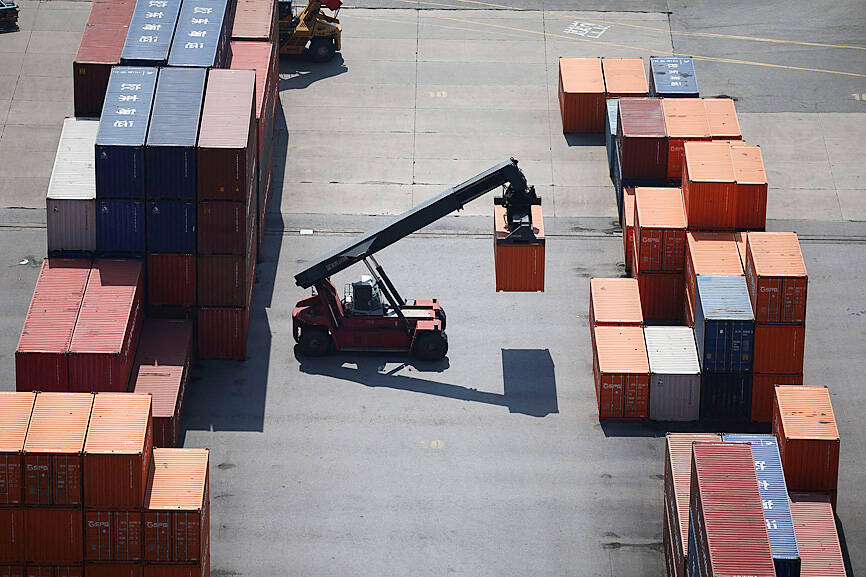South Korea has found increased attempts to disguise foreign products as Korean exports, primarily from China, to avoid US President Donald Trump’s sweeping tariffs, its customs agency said yesterday.
The Korea Customs Service (KCS) said that after a special probe last month, it has found 29.5 billion won (US$20.8 million) worth of contraventions related to products’ country of origin from the first quarter, with US-bound shipments accounting for 97 percent of the total.
That compares with a total of 34.8 billion won worth of contraventions for all of last year, among which US-bound shipments accounted for 62 percent.

Photo: Reuters
Trump has imposed significant tariffs on various products and countries, including those on China that began to rise in February.
“There was a rise in disguised export attempts during Trump’s first presidency, and we expect there to be a similar trend,” KCS investigation planning director Lee Kwang-woo said.
Anticipating increased risks, authorities conducted the latest investigation pre-emptively to prevent illegal exports.
They have already found signs of attempts to avoid Trump’s tariffs from the first quarter, Lee said during a news briefing.
South Korean customs officials held a meeting with US officials yesterday to discuss joint investigation efforts.
South Korean officials have said there could be a rise in attempts by foreign companies, such as those in China, to use South Korea as a bypass to avoid tariffs and regulations.
Trump slapped 25 percent tariffs on South Korea this month, among a new set of sweeping levies, which were later suspended for three months. In comparison, the US now levies 145 percent tariffs on China after back-and-forth retaliatory actions.
Yesterday’s findings include 3.3 billion won worth of cathode materials used for batteries, imported from China and shipped to the US, with South Korea falsely marked as the country of origin to avoid already high tariffs in January, even before Trump’s tariffs took effect.
In addition, 19.3 billion won worth of surveillance cameras last month were imported from China in parts and reassembled in South Korea to bypass US restrictions on Chinese communication devices, the KCS said.
Some of the goods have been shipped abroad while others are still at the port.
The Korea Customs Service has launched a special task force to prevent attempts to illegally export such goods and plans to come up with more specific response measures to protect domestic companies. Meanwhile, the violations discovered will be referred to prosecutors.

SEMICONDUCTORS: The German laser and plasma generator company will expand its local services as its specialized offerings support Taiwan’s semiconductor industries Trumpf SE + Co KG, a global leader in supplying laser technology and plasma generators used in chip production, is expanding its investments in Taiwan in an effort to deeply integrate into the global semiconductor supply chain in the pursuit of growth. The company, headquartered in Ditzingen, Germany, has invested significantly in a newly inaugurated regional technical center for plasma generators in Taoyuan, its latest expansion in Taiwan after being engaged in various industries for more than 25 years. The center, the first of its kind Trumpf built outside Germany, aims to serve customers from Taiwan, Japan, Southeast Asia and South Korea,

Nvidia Corp chief executive officer Jensen Huang (黃仁勳) on Monday introduced the company’s latest supercomputer platform, featuring six new chips made by Taiwan Semiconductor Manufacturing Co (TSMC, 台積電), saying that it is now “in full production.” “If Vera Rubin is going to be in time for this year, it must be in production by now, and so, today I can tell you that Vera Rubin is in full production,” Huang said during his keynote speech at CES in Las Vegas. The rollout of six concurrent chips for Vera Rubin — the company’s next-generation artificial intelligence (AI) computing platform — marks a strategic

Gasoline and diesel prices at domestic fuel stations are to fall NT$0.2 per liter this week, down for a second consecutive week, CPC Corp, Taiwan (台灣中油) and Formosa Petrochemical Corp (台塑石化) announced yesterday. Effective today, gasoline prices at CPC and Formosa stations are to drop to NT$26.4, NT$27.9 and NT$29.9 per liter for 92, 95 and 98-octane unleaded gasoline respectively, the companies said in separate statements. The price of premium diesel is to fall to NT$24.8 per liter at CPC stations and NT$24.6 at Formosa pumps, they said. The price adjustments came even as international crude oil prices rose last week, as traders

Taiwan Semiconductor Manufacturing Co (TSMC, 台積電), which supplies advanced chips to Nvidia Corp and Apple Inc, yesterday reported NT$1.046 trillion (US$33.1 billion) in revenue for last quarter, driven by constantly strong demand for artificial intelligence (AI) chips, falling in the upper end of its forecast. Based on TSMC’s financial guidance, revenue would expand about 22 percent sequentially to the range from US$32.2 billion to US$33.4 billion during the final quarter of 2024, it told investors in October last year. Last year in total, revenue jumped 31.61 percent to NT$3.81 trillion, compared with NT$2.89 trillion generated in the year before, according to